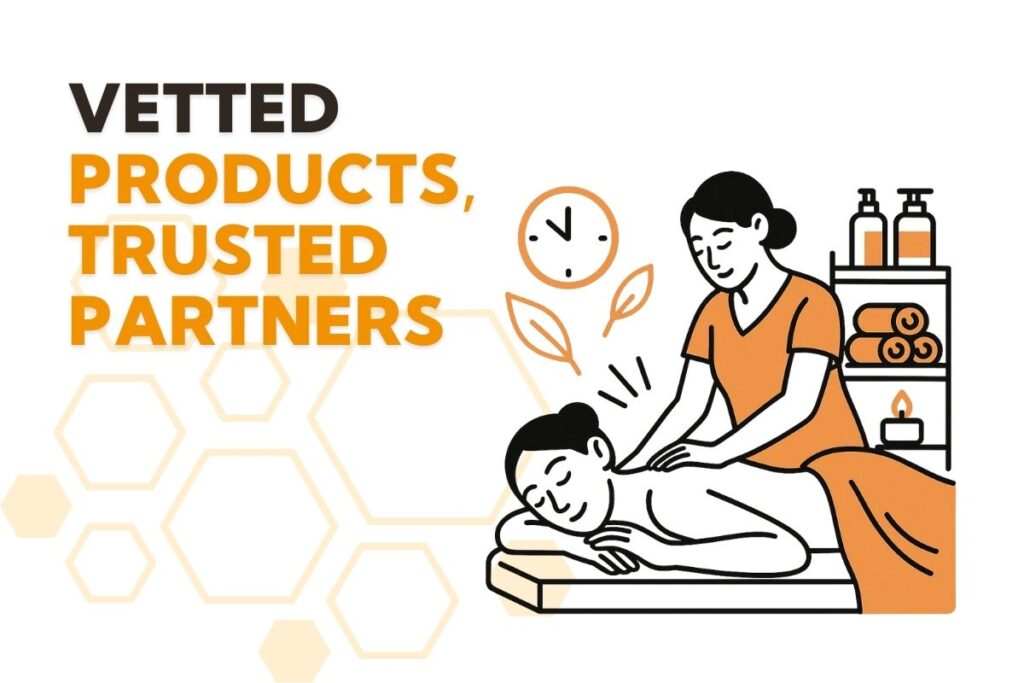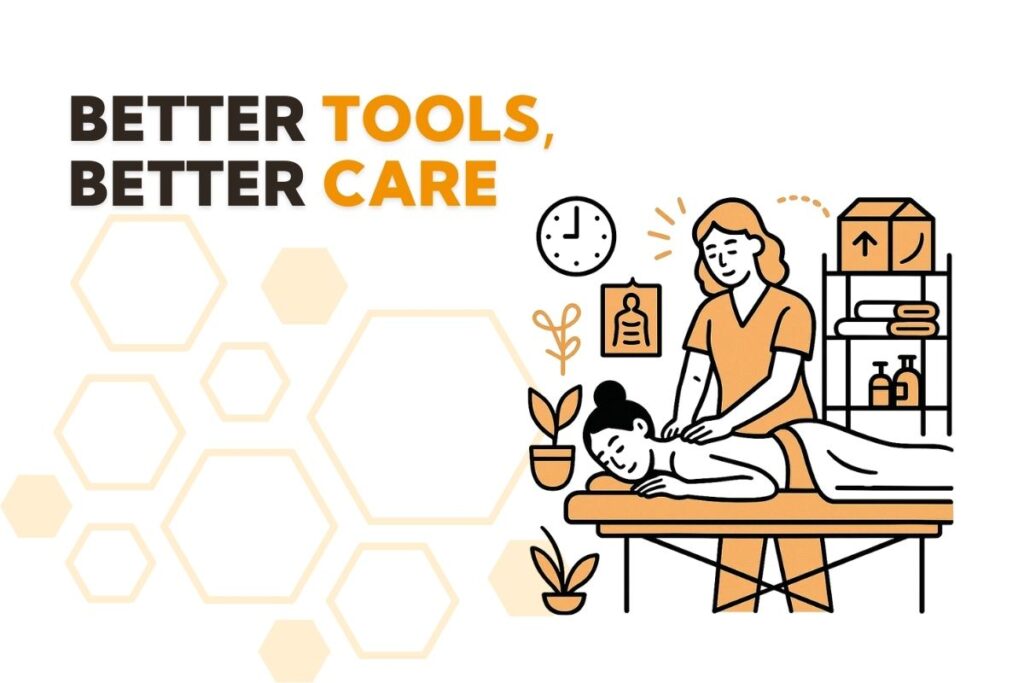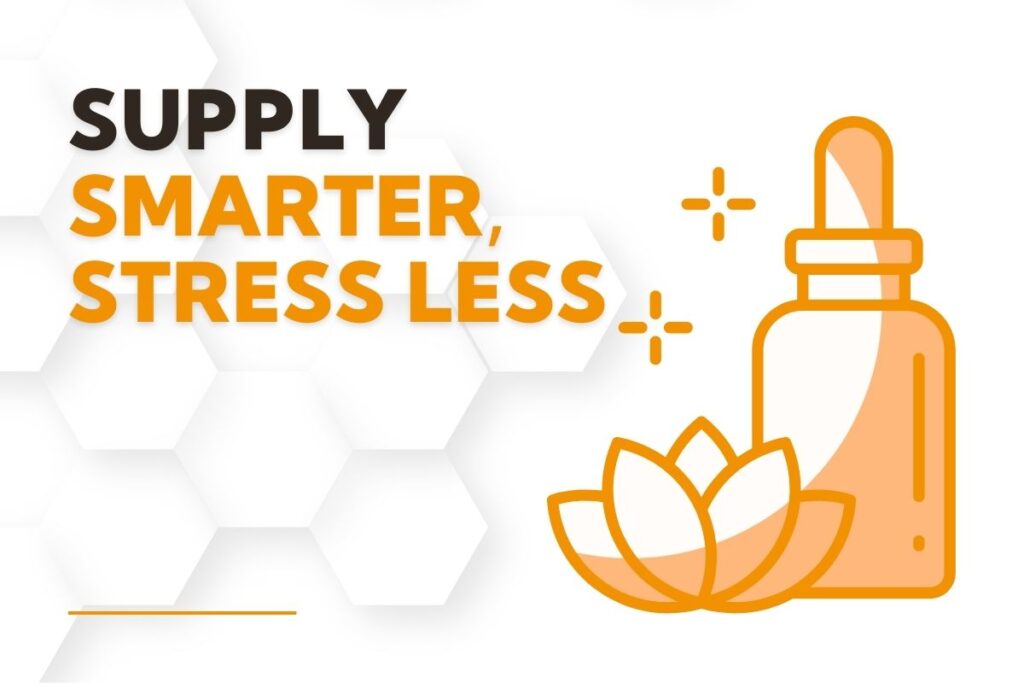Unreliable suppliers are more than just inconvenient—they can jeopardize your reputation, revenue, and client experience. Here’s how to find reliable suppliers you can actually count on.
When Your Backbar Becomes a Bottleneck
Finding reliable suppliers for your massage clinic is more than a logistical need—it’s essential to maintaining consistent care, protecting your time, and preserving your reputation. If you’ve ever had to cancel an appointment because your massage oil didn’t arrive—or worse, it arrived with the wrong product—you’re not alone.
In fact, according to a 2024 survey by the Canadian Federation of Independent Business, over 60% of small business owners reported supply disruptions as a top operational stressor. For massage clinic owners, these disruptions don’t just mean inconvenience—they directly affect your ability to serve clients, maintain consistent quality, and keep therapists equipped.
But sourcing reliable suppliers for your massage clinic doesn’t have to feel like a gamble. With the right systems, vetting process, and internal tools, you can take control of your supply chain and get back to focusing on what matters: healing work.
Why Unreliable Suppliers Cost More Than You Think
Missed Appointments, Missed Revenue
Every late shipment or damaged product can lead to appointment cancellations or subpar treatment experiences. That’s money out the door—and trust lost with your clients.
Quality Risks Hurt Client Outcomes
Using low-quality oils, linens, or tools can cause skin reactions, discomfort, or ineffective treatments. Clients may not always voice concerns—but they’ll remember the experience.
Staff Morale and Time Drain
Your therapists didn’t sign up to chase reliable suppliers or check stock between clients. When reliable systems aren’t in place, administrative work piles up and morale dips.

What’s Causing the Supply Chaos?
Ongoing Global Disruptions
From international shipping delays to domestic inventory shortages, the ripple effects of the pandemic and labor shortages continue to impact product availability across wellness industries.
Increased Demand for Therapeutic Products
The wellness boom has more clinics and independent therapists buying in bulk, leading to inconsistent stock across the board—especially for specialty items like eco-friendly lotions or hypoallergenic linens.
Lack of Industry-Specific Suppliers
Massage clinics have unique needs, but many generic suppliers don’t understand product lifecycles, sanitation requirements, or delivery urgency in a treatment-based business.
Common Pitfalls in Sourcing Massage Supplies
Prioritizing Price Over Performance
A bulk lotion deal might look great—until you open the bottles and find the scent overpowering or the texture unusable for deep tissue work.
Failing to Vet Vendors Properly
Without reference checks, trial orders, or return policies in writing, it’s easy to fall into the trap of supplier regret.
Neglecting Communication Standards
A reliable suppliers isn’t just about fulfillment—they’re your partner. If they take three days to answer an email, it’s a red flag for bigger issues down the road.
What to Look for in a Reliable Massage Supplier
Consistency and Timeliness
- Do they meet promised shipping windows?
- Are reorders consistent in quality and packaging?
Quality Assurance
- Are ingredients clearly listed?
- Do linens hold up to commercial laundering?
Transparent Policies
- Is the return policy clinic-friendly?
- Are minimum order requirements clearly stated?
Responsiveness and Support
- Can you reach a dedicated account manager?
- Do they proactively alert you to stock shortages or delays?
Industry Understanding
Suppliers that cater to therapeutic environments understand the stakes. Look for signs they serve health professionals—not just general retail.
How to Find and Vet Your Ideal Supplier
Step 1: Start With Trusted, Industry-Backed Sources
Begin your search with sources that are already vetted by the massage therapy community. Look through your provincial massage association’s supplier directories, local massage therapy school partnerships, and vendor listings in industry publications. These platforms often feature businesses with proven track records of reliability and compliance.
Also consider attending massage-focused trade shows, conferences, and virtual expos. These events allow you to meet suppliers face-to-face, ask questions in real time, and get hands-on with products before making a commitment.
Pro tip: Join your provincial massage association’s member portal or Facebook group. Many clinics openly share supplier reviews, warnings, and recommendations in real time—making it a goldmine for finding peer-approved vendors.
Step 2: Request Samples and Test in Real-World Settings
Before committing to a bulk purchase, ask for sample sizes of oils, lotions, linens, and equipment. Use them during actual treatments—not just test applications—so you and your team can assess how they hold up under pressure.
Ask your therapists:
- Did the product support different massage techniques (e.g., deep tissue vs. Swedish)?
- Did it absorb properly without leaving residue?
Ask your clients:
- How did they feel about the scent, texture, and after-effect?
- Did any sensitivities or irritation occur?
Gather this feedback and document it. What may seem like a small detail—such as the grip on a bottle or the pilling of a sheet—can make a big impact when scaled across dozens of sessions per week.
Step 3: Contact Supplier References and Ask the Right Questions
Reputable suppliers should have no issue connecting you with current or recent clients. When you speak with them, go beyond general satisfaction and dig into logistics:
- Reliability: How often do deliveries arrive on time? Have they experienced unexpected backorders?
- Responsiveness: How quickly are issues or returns handled? Is there a consistent point of contact?
- Product Accuracy: Are orders complete and as described?
- Longevity: How long have they worked with this supplier—and are they still using them?
These conversations are often where the real red flags (or green lights) show up.
Step 4: Test Their Ordering and Customer Service Experience
Before making any long-term commitments, place a small test order to evaluate the supplier’s processes. This is your chance to experience their service as a customer.
Watch for:
- Ease of Ordering: Is their website or portal easy to navigate? Are SKUs clearly labeled?
- Communication: Do you receive confirmation emails, tracking numbers, and estimated delivery dates?
- Customer Support: If you send a question or request, how quickly do they respond—and do they resolve the issue or deflect it?
Reliable suppliers for your massage clinic should feel like partners, not like another problem to manage.
Step 5: Negotiate Clear Terms That Safeguard Your Clinic
Once you’re satisfied with the product and service quality, take the time to negotiate and clarify terms in writing. This protects you from future surprises and sets the tone for a professional relationship.
Key details to confirm:
- Lead Times: What’s their standard shipping window? Are rush orders possible?
- Shipping and Restocking Fees: Are there minimum order thresholds for free shipping? What’s the process and cost for returns?
- Volume Discounts: Can you save by ordering quarterly or annually?
- Loyalty Incentives: Are there perks for repeat business or referrals?
Don’t be afraid to ask for custom terms, especially if you’re committing to recurring purchases. Reliable suppliers often appreciate long-term partnerships and are open to tailoring agreements to fit your clinic’s needs.

Avoiding a Midday Meltdown
Case: Inner Radiance Massage, Edmonton
Clinic owner Tara switched to a new “eco” supplier after a colleague’s referral but skipped the sample step. When the lotion arrived, the pump nozzles were incompatible with their dispensers—and the texture was too slick for deep tissue work.
The result? Two therapists lost treatment time trying to fix the issue mid-session, and four clients left with less-than-optimal care.
Tara now uses a strict vetting checklist and always places a small test order before committing. Her new supplier even sends automated low-stock reminders—preventing future product emergencies.
Want to streamline your inventory alerts like Tara? Use automated inventory notifications in Hivemanager to track usage patterns and restock smarter.
Build Relationships, Not Just Transactions
Stay in Touch
Make time once per quarter to check in with your key suppliers. Ask what’s changing on their end—seasonal shortages, pricing updates, or product innovations.
Be a Reliable Customer
Pay on time, provide prompt feedback, and communicate upcoming needs (like seasonal bulk orders). You’ll be prioritized when supplies run low.
Document Supplier Agreements
Keep records of product specs, ordering history, and any issues—especially if multiple team members place orders. Hivemanager’s supplier tracking features can help you centralize everything in one place.
Using Tech to Stay Ahead of Supply Issues
Even the best supplier relationships can’t replace a solid system. Here’s how technology makes sourcing smoother:
- Automated Reorder Points: Set thresholds for high-turnover items to avoid stockouts.
- Digital Supplier Lists: Keep contact details, preferred SKUs, and ordering instructions accessible to your whole team.
- Expense Reporting: Track supplier costs month over month to improve budgeting and negotiate bulk discounts.
Tools like these keep your focus on treatments—not tracking down that missing bottle of oil.
Your Supply Chain Shouldn’t Be a Stress Chain
Reliable suppliers are more than just vendors—they are a direct reflection of your clinic’s professionalism, care standards, and reliability. Every product you use, from the linens on the table to the oil in your hands, speaks to the level of trust your clients place in you. When your suppliers deliver consistently, it allows your team to focus on what they do best: providing exceptional care without interruption or stress.
Taking the time to carefully vet and maintain supplier relationships isn’t just about cutting costs or avoiding backorders—it’s a foundational part of protecting your reputation, supporting your staff, and ensuring your operations run smoothly.
You don’t need to overhaul everything at once. Start small. Identify one product or vendor you’ve had doubts about—maybe it’s a lotion that runs out too fast, or a backorder that’s become too frequent. Begin the vetting process this week. Request samples, clarify terms, or explore new options with better support.
It’s one of the smartest, most proactive investments you can make—not just for your business, but for the long-term trust and loyalty of every client who walks through your doors.
FAQs
Start by checking directories from professional massage associations, trade shows, and peer referrals. Prioritize vendors who understand therapeutic environments over general e-commerce stores.
Look for consistent product quality, on-time delivery, positive references, and responsive customer service. Testing with a small order is a key step.
Ideally, have a primary supplier and 1–2 backups for critical products. This ensures continuity if one vendor experiences delays or stockouts.
Yes. Automation tools help you track stock, predict needs, and prevent disruptions. Platforms like Hivemanager offer features designed specifically for massage clinics.


